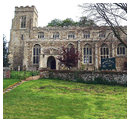  |
 |
 |
 |
 |
| Thu 26 Feb 2026 |

The History Of Saint Nicholas' Church DenstonHistoryThe church is dedicated to St. Nicholas, patron saint of sailors and children, and is one of eighteen like dedications in Suffolk. A church existed on this site in the twelfth century but the present building, apart from the tower, was rebuilt almost from the ground in the latter part of the fifteenth century; and a "college" - that is an association - of chantry priests, one master and two co-brethren was incorporated with 'the Parish church in fulfilment of the terms of the will of John Denston. For a considerable time, the parishioners and parish of Denston like many others, had suffered from the alienation of tithes and land to monastic foundations, supposed in return to provide priests for the church; but in fact these often resided in the parish for a short part of the Year only. Many charitable landowners solicitous for the well being of their tenants, would from their own revenues provide for chantry priests, who, in addition to saying masses for the souls of the donors would minister to the parishioners, and so offset the depredations of the monastic foundations. John Denston, whose family had been at the manor house of Denston for three generations, was following this tradition when he made provision for the chantry. His son-in-law, Sir John Broughton, and Sir John Howard (later Duke of Norfolk and killed on Bosworth Field), were executors of the will, and letters patent were obtained from King Edward IV in 1475 giving them licence to found this perpetual chantry to celebrate "for ever the divine offices day by day … for the souls of John Denston and Katharine his wife … and for their heirs when they shall have migrated from this light … and for the souls of all the faithful departed." John Denston died in 1473 or 1474 and the chantry lasted till the first year of Edward Vl's reign having survived the dissolution of the monasteries in 1536 and 1538 but coming into the possession of the Crown in 1547/8 under an Act passed shortly before the death of Henry VIII. In the deed of sale of the endowment of the chantry in the reign of Edward VI, it is stated that the priests "do celebrate wythin the … parrische churche of Denstone and their mansyon house standeth adyoyning to the same churche." Part of this "mansyon house" can still be seen, being now the cottage to the west of the church; and it is so designated in a map made in the seventeen century. Two well-known master masons of the fifteenth century have connections with Long Melford and in view of the relationship of the Denstons with the Long Melford families, it is possible they may have advised on the building of Denston church. William Wolsey, who worked in East Anglia, may have been employed by John Clopton on work at Long Melford House, Kentwell Hall or the church. Reginald Ely, one of the four master masons responsible for King's College Chapel, is traditionally connected with Burwell and Thaxted churches. The will of John Mason of Sudbury and Long Melford refers to his master, Reginald Ely. Some of the work in the Martyn Chapel at Long Melford church is reminiscent of Reginald Ely's and as similar work can be seen at Cavendish church it is not beyond the bounds of possibility that Reginald Ely's pupil was concerned with Denston church. There is some fine carving of the sixteenth century in the old farm house to the east of Denston church. This farm house, known as Chantry Farm (though this name has only been applied since 1885, it being known previously as Parsonage Farm or Church Farm), was in 1521 in the possession of Henry Everard, whose monumental brass is in the church; later the lease was held by John Ray, the rector, whose family came from Wickhambrook, and who was connected by marriage with the Everards. A descendant, Clement Ray, also rector, is buried within the sanctuary. An earlier Ray, whose will was proved on July 16th, 1503, bequeathed to the church "a cope of blue velvet and tunicles of blue velvet to be bought according to the vestment of blue velvet that is belonging to the church." |

